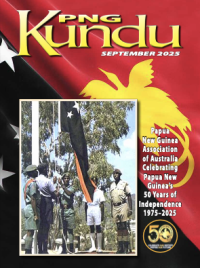A nutty story: Rod Noble
PNG’s location on the Pacific Ocean’s Ring of Fire was given bad press with the death and destruction at many locations, including pre and post war Rabaul, Mt Lamington and Manum and Kairiru Island. However a recent note regarding the death of two vulcanologists on Kairiru Is reminded me of a benign volcanic event: a non-event really.
One day in 1954, DC Sid Elliot-Smith called rne to his office. “Noble,” he said, “you will accompany the Rabaul volcanologist to Blup Blup Island”. He explained that a Qantas pilot, en route to Hollandia (now Jayapura), had reported volcanic activity there. If so advised by the expert I was to organize the evacuation of some 400 inhabitants.
With a RPNGC sergeant and my haus boi, we boarded the government launch (MV Thetis?) By late afternoon the small island appeared off the bow; Mt Fujiyama shaped, a dense green skirt, a grey collar and belching smoke like a steam train.
The expert said he wanted to land and would inspect the volcano the next day. In the interest of protecting government property, I decided that the vessel and I should spend the night behind a nearby island! When anchored there my haus boi asked me for a couple of cartridges to shoot some pigeons ashore. I agreed: it sounded better than more bully beef for supper. Very soon he had returned without firing a shot. I asked why, as I could hear a large flock of the birds settling down for the night. He told me that the viilage luluai [head man] had requested that the birds be spared. He explained that the birds were in GALIP* nut trees. The nuts were an important cash crop for the locals. I was told that they were harvested by being picked up from the ground after the birds had digested the husk. Saved a lot of arduous tree climbing!
With this piece of interesting information learnt I landed on Blup Blup next morning and climbed the volcano with the vulcanologist and trepidation.
Although more than half a century ago, I can still see and smell that active volcanic scene: it makes one resolve to keep all Ten Commandments. Fire and brimstone was issuing from several fumaroles and the sulphurous smell was horrific. The expert calmly took notes and photos. Evacuation was not recommended and so we all returned to base.
One other recollection of that trip. As elsewhere, some rainwater is collected in old canoes from the nipa roofs. When I asked about streams or wells I was told there were none: not needed. The island is only a few miles from the Sepik delta and such is the volume and rate of flow, up to 4 knots in spate, that they could dip water at the beach. No doubt brackish, but lifesaving.
* GALIP (Canarium indicum): 20-30m tall with canopy 15 – 20 m; lowland tropical tree widely planted around villages in lndonesia, Solomon Islands, Vanuatu and PNG. This proteinaceous product from tropical rain forests has a delicious kernel especially if salted and lightly fried in tinned butter. In PNG the shell is carved into tumbuan (traditional face mask) and was sold to tourists for three mark (shillings). The EU is funding support for a new, cash crop industry for the canarium nut having an estimated value of US$300 million. Maybe it will appear in our local Woolies one day soon?



